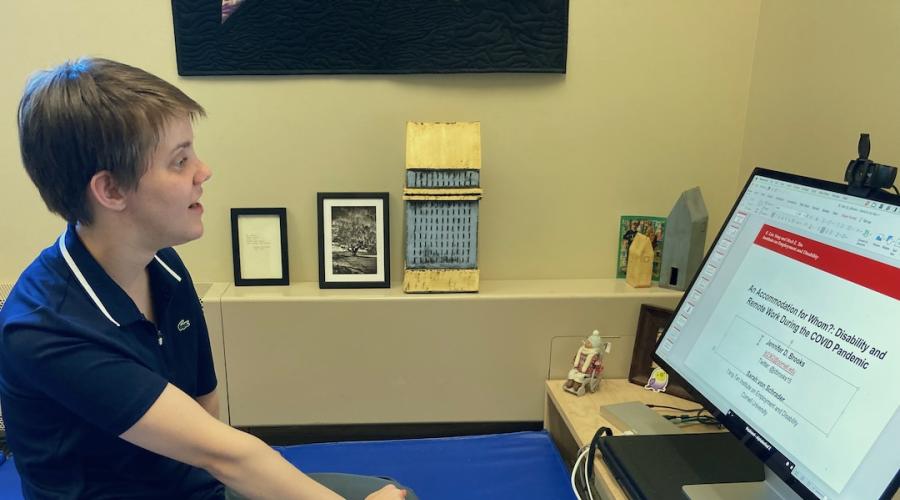
Best Paper Award Won by Yang-Tan Researchers
An award-winning paper by researchers in Cornell ILR’s Yang-Tan Institute on Employment and Disability reveals that although more people are now working remotely in the United States, the percentage of workers with disabilities in flexible and remote work positions did not increase after the start of the COVID-19 pandemic nearly as much as it did for those without disabilities.
An Accommodation for Whom? Has the COVID-19 Pandemic Changed the Landscape of Flexible and Remote Work for Workers with Disabilities? examines whether gender, race, age and educational attainment are important factors that explain why workers with disabilities did not obtain as much remote employment as workers who do not have disabilities.
The paper was published in the Employee Responsibilities and Rights Journal on Oct. 14. It was selected by NARRTC’s Research Committee as the best manuscript in 2023 that was funded by the National Institute on Disability, Independent Living, and Rehabilitation Research. The committee evaluated papers based on novelty, importance, methodology and significance.
First author Jennifer D. Brooks will present the research when the Best Paper Award is formally announced on May 21 at the annual NARRTC conference in Alexandria, Virginia. Sarah von Schrader, director of research and program evaluation at the Yang-Tan Institute, is the paper’s co-author. About 75% of working-age adults in the United States are employed, but only about 33% of working-age adults with disabilities are employed. Reasons for this huge gap include discrimination, misconceptions, denial by employers of needed accommodations, and policy and structural barriers. The paper notes that an issue in understanding this gap is a need for more research that probes the multiplicity of factors that may decrease a person’s access to employment.
Brooks explains in the paper that “intersectionality views status-based characteristics (i.e., race/ethnicity, gender, disability status, sexuality, etc.) as puzzle pieces. While each piece contains some information, the pieces must be assembled into a picture to fully understand how an individual’s status-based characteristics work in tandem to shape their experiences of social institutions, such as the labor market.”
The study found that before the COVID-19 pandemic, workers with disabilities reported similar rates of flexible work hours, formal work-from-home arrangements and fully remote work as those without disabilities, but in 2020, only 26% of U.S. employees with disabilities worked remotely, compared to 36% of those without disabilities.
“What we learned was that regardless of year, flexible and remote work rates vary by demographic group, with disabled workers who are white, female, and college-educated more likely to access these options than multiply marginalized disabled workers,” Brooks said.
The research showed that workers with disabilities who were less likely to have obtained flexible or remote work were male, had less education or were not white. The paper cites other studies to explain that these characteristics correspond to a person with a disability being more likely to have a job that must be done onsite or more likely to have a request for a remote-work disability accommodation denied by their employer.
The paper’s conclusion emphasizes the importance of recognizing that people with disabilities have many different backgrounds, saying “it is imperative that employment policies and programs that target people with disabilities take the intersection of ableism, racism, sexism, classism, ageism, and other forms of oppression into account to create a labor market that is accessible for all.”
“As the nature of work shifts dramatically, it is crucial for us to continue to document and assess the extent to which there is equitable access to advances in where and how individuals work,” said Ariel Avgar, senior associate dean for outreach and sponsored research at Cornell University’s ILR School.
“Dr. Brooks’ research is a perfect illustration of the power that applied social science on work has to inform policymakers and practitioners with the goal of addressing longstanding and persistent inequities around work and employment for marginalized groups. The Yang-Tan Institute for Employment and Disability has long been on the forefront of driving action that benefits individuals with disabilities through rigorous applied research,” Avgar said.
Brooks received a bachelor’s degree in sociology from Grinnell College in 2015, and a Ph.D. in sociology from Syracuse University in 2021. She began working at the Yang-Tan Institute in 2021. Her research focuses on the intersection of disability, intersectionality and the labor market.
Von Schrader has a bachelor’s degree in mathematics from Colorado College and a Ph.D. in education measurement and statistics from the University of Iowa. She began working at Cornell University in 2009. In her role as director of research and program evaluation at the Yang-Tan Institute, she Ieads research and evaluation projects, working with a diverse team of researchers and practitioners. Her own research focuses on employer practices related to successful recruitment, hiring and advancement of people with disabilities.
The Yang-Tan Institute on Employment and Disability in the ILR School conducts a combination of research and outreach. Its mission is to advance knowledge, policies, and practice that enhance equal opportunities for all people with disabilities. Its research, training, and technical resources expand knowledge about disability inclusion, leading to positive change.